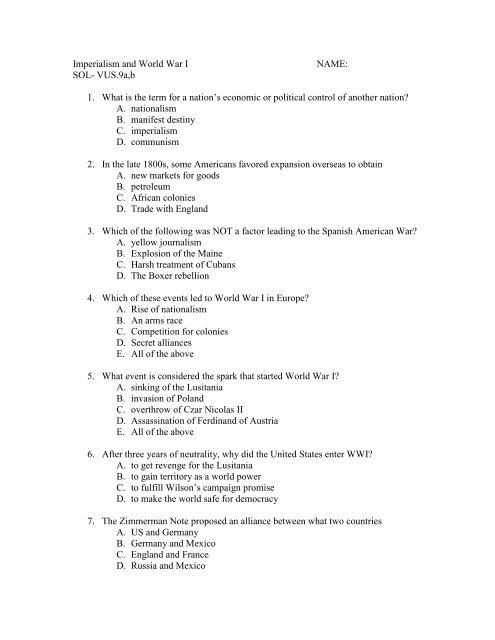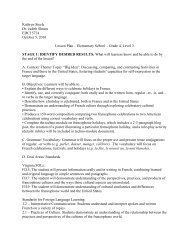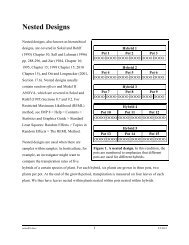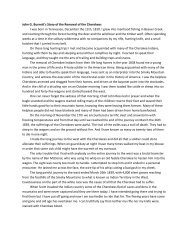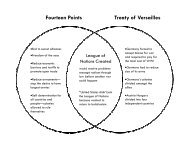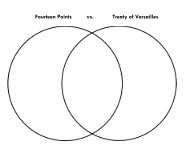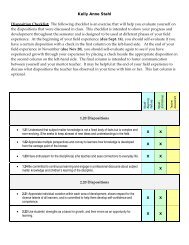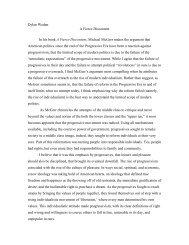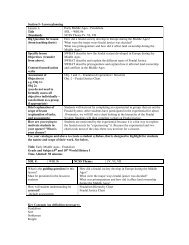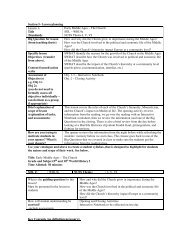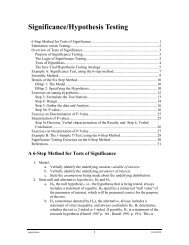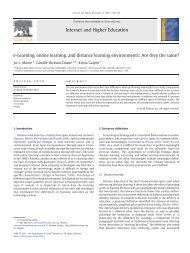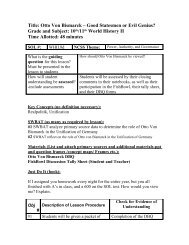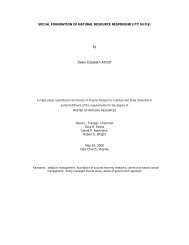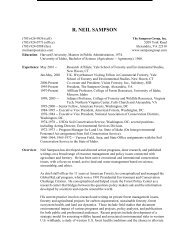Imperialism and World War I Unit Test - Scholar
Imperialism and World War I Unit Test - Scholar
Imperialism and World War I Unit Test - Scholar
You also want an ePaper? Increase the reach of your titles
YUMPU automatically turns print PDFs into web optimized ePapers that Google loves.
<strong>Imperialism</strong> <strong>and</strong> <strong>World</strong> <strong>War</strong> I NAME:<br />
SOL- VUS.9a,b<br />
1. What is the term for a nation’s economic or political control of another nation?<br />
A. nationalism<br />
B. manifest destiny<br />
C. imperialism<br />
D. communism<br />
2. In the late 1800s, some Americans favored expansion overseas to obtain<br />
A. new markets for goods<br />
B. petroleum<br />
C. African colonies<br />
D. Trade with Engl<strong>and</strong><br />
3. Which of the following was NOT a factor leading to the Spanish American <strong>War</strong>?<br />
A. yellow journalism<br />
B. Explosion of the Maine<br />
C. Harsh treatment of Cubans<br />
D. The Boxer rebellion<br />
4. Which of these events led to <strong>World</strong> <strong>War</strong> I in Europe?<br />
A. Rise of nationalism<br />
B. An arms race<br />
C. Competition for colonies<br />
D. Secret alliances<br />
E. All of the above<br />
5. What event is considered the spark that started <strong>World</strong> <strong>War</strong> I?<br />
A. sinking of the Lusitania<br />
B. invasion of Pol<strong>and</strong><br />
C. overthrow of Czar Nicolas II<br />
D. Assassination of Ferdin<strong>and</strong> of Austria<br />
E. All of the above<br />
6. After three years of neutrality, why did the <strong>Unit</strong>ed States enter WWI?<br />
A. to get revenge for the Lusitania<br />
B. to gain territory as a world power<br />
C. to fulfill Wilson’s campaign promise<br />
D. to make the world safe for democracy<br />
7. The Zimmerman Note proposed an alliance between what two countries<br />
A. US <strong>and</strong> Germany<br />
B. Germany <strong>and</strong> Mexico<br />
C. Engl<strong>and</strong> <strong>and</strong> France<br />
D. Russia <strong>and</strong> Mexico
8. Which of the following countries was not a Central Power in <strong>World</strong> <strong>War</strong> I?<br />
A. Germany<br />
B. Austria-Hungary<br />
C. The Ottoman Empire<br />
D. Russia<br />
9. Yellow-Journalism is best described as<br />
A. editorials criticizing war<br />
B. factual, eyewitness accounts<br />
C. exaggerated, sensational news reporting<br />
D. newspapers printed on cheap paper<br />
10. What was not a result of the Spanish American <strong>War</strong>?<br />
A. Puerto Rico became a US possession<br />
B. Cuba became a US possession<br />
C. The US gained the Philippines<br />
D. The need for a canal in Panama was realized<br />
11. The Open Door Policy was intended to<br />
A. allow Japanese workers into the US<br />
B. allow free immigration from China<br />
C. open China to US trade<br />
D. gain the canal zone from Colombia<br />
12. Following the Spanish American <strong>War</strong>, what gave the US the right to intervene in<br />
Cuba?<br />
A. Platt Amendment<br />
B. Treaty of Paris 1898<br />
C. Open Door Policy<br />
D. Hay-Buena Varilla Treaty<br />
13. In the late 1800s, negative attitudes toward Chinese immigration led to<br />
A. Boxer Rebellion<br />
B. Chinese Exclusion Act<br />
C. Open Door Policy<br />
D. The Gentleman’s Agreement<br />
14. What was meant by the term “home front”?<br />
A. the area of the front that was safer <strong>and</strong> more comfortable<br />
B. an area subject to enemy attack behind the front line<br />
C. the idea that everyone at home must help to win the war<br />
D. a safe <strong>and</strong> free area in the combat zone<br />
E. All of the above
15. What was Wilson’s plan for peace called?<br />
A. the New Freedom<br />
B. the Square Deal<br />
C. the 14 Points<br />
D. 1000 points of Light<br />
16. Which best describes Woodrow Wilson?<br />
A. President during WWI<br />
B. General who led American troops<br />
C. Head of the <strong>War</strong> Industries Board<br />
D. An actor who helped sell war bonds<br />
17. Which best describes John J. Pershing?<br />
A. President during WWI<br />
B. General who led American troops<br />
C. Head of the <strong>War</strong> Industries Board<br />
D. An actor who helped sale war bonds<br />
18. Columbia owned territory that was the proposed site of<br />
A. V<strong>and</strong>erbilt’s canal<br />
B. The Nicaragua canal<br />
C. The Panama canal<br />
D. The Statue of Liberty<br />
19. How did Teddy Roosevelt express his view about using the military?<br />
A. “Actions speak louder than words.”<br />
B. “Speak softly <strong>and</strong> carry a big stick.”<br />
C. “The l<strong>and</strong> divided, the world united.”<br />
D. “He who hesitates is lost.”<br />
20. The US Congress refused to ratify the Treaty of Versailles because of which<br />
article?<br />
A. Germans must restore conquered territory<br />
B. The Ottoman Empire would be broken up into m<strong>and</strong>ates<br />
C. Germany must pay reparations<br />
D. A League of Nations would be established<br />
21. Which of the following results of WWI was a cause of WWII?<br />
A. The harsh dem<strong>and</strong>s the treaty placed on Germany<br />
B. Germany had to accept war guilt <strong>and</strong> pay reparations<br />
C. The Failure of the US to join the League of Nations<br />
D. The economic instability which followed the war<br />
E. All of the above
22. WWI provided jobs <strong>and</strong> opportunity for all the following EXCEPT<br />
A. Women<br />
B. African-Americans<br />
C. Immigrants<br />
D. Ship-builders<br />
23. Which is true concerning the role of women in WWI?<br />
A. They contributed very little to the war effort<br />
B. They kept the nation’s economy going during the war<br />
C. Their role differed little from their peacetime role<br />
D. They focused their efforts on ending the war<br />
24. Which President’s foreign policy was based on dollar diplomacy?<br />
A. Woodrow Wilson<br />
B. William McKinley<br />
C. Theodore Roosevelt<br />
D. William Howard Taft<br />
25. What was the most significant effect of the Spanish-American <strong>War</strong>?<br />
A. Spain’s naval power was diminished<br />
B. The US became a world power<br />
C. The US gained colonial territories in Africa<br />
D. Hawaii <strong>and</strong> Alaska became states<br />
26. What is the term for information spread to help or harm a cause?<br />
A. Reparations<br />
B. Propag<strong>and</strong>a<br />
C. Mobilization<br />
D. Armistice<br />
27. What is the term for an agreement to end fighting<br />
A. reparations<br />
B. Propag<strong>and</strong>a<br />
C. Ultimatum<br />
D. Armistice<br />
28. What was the unit led by Teddy Roosevelt known as?<br />
A. The 5 th Virginia infantry<br />
B. The Rough Riders<br />
C. Teddy’s Rangers<br />
D. Roosevelt’s cavalry<br />
29. As a Pacific isl<strong>and</strong>, Guam was important to the US military as<br />
A. A refueling station<br />
B. A weapons testing area<br />
C. An isolated prison<br />
D. A base to attack Asia
30. What would lead the US to annex Hawaii?<br />
A. The Open Door Policy<br />
B. The Chinese Exclusion Act<br />
C. Dollar Diplomacy<br />
D. Big Stick Diplomacy<br />
II. Please answer two of the following in well developed paragraphs.<br />
(This means more than one short paragraph.)<br />
1. Analyze three causes of the Spanish American <strong>War</strong><br />
2. Analyze three causes of <strong>World</strong> <strong>War</strong> I.<br />
3. Explain how new technology influenced the conduct of WWI.<br />
4. Compare the use of propag<strong>and</strong>a in the Spanish American <strong>War</strong> <strong>and</strong> <strong>World</strong> <strong>War</strong> I.


